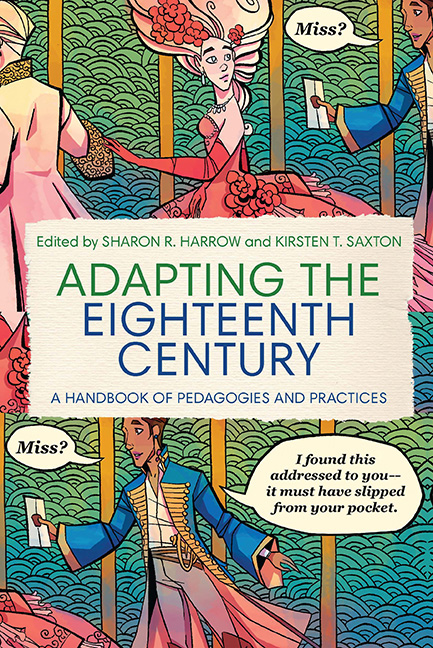Book contents
- Frontmatter
- Dedication
- Contents
- Acknowledgments
- Introduction
- 1 “Je suis Voltaire,” or, Appropriating the Philosophe in the Social Media Age
- 2 “Who Lives, Who Dies, Who Tells Your Story?”: The Uses of Hamilton in Special Collections Pedagogy and Public Engagement
- 3 Performing Frankenstein in the South: Sex, Race, and Science across the Disciplines
- 4 French Fairy Tales and Adaptations in the Twenty-First-Century Classroom
- 5 Select Trials at the Sessions-House in the Old-Bailey (1742) and Mark Ravenhill’s Mother Clap’s Molly House (2001)
- 6 Teaching with The Pilgrim’s Progress Video Game
- 7 Eliza Haywood’s “Bad Habits”: Teaching Adaptations of Fantomina: or, Love in a Maze and The Distress’d Orphan; or, Love in a Madhouse
- 8 Teaching Eighteenth-Century Literature through Eighteenth- Century Adaptations: Adaptive Structures
- 9 “A Private Had Been Flogged”: Adaptation and the “Invisible World” of Jane Austen
- 10 Fifty Shades of Pamela in the Undergraduate Classroom
- 11 Teaching the Austen-Monster-Mashup: Sense and Sensibility and Sea Monsters
- 12 Learning to Adapt: Teaching Pride and Prejudice and Its Adaptations in General Education Courses
- 13 Race and Romance: Adapting Free Women of Color in the Long Eighteenth Century
- 14 The Crusoeiana: Material Crusoe
- 15 Adaptation in Strange Places: Terrence Malick’s To the Wonder and the Narrative Effect and Form of Samuel Richardson’s Pamela
- 16 Adapting the Tombeaux des Princes: A Study in Media Variations
- 17 Experiential Pedagogy to Join the Thread of Conversation with Paul et Virginie
- 18 “Lookin’ for a Mind at Work”: Hamilton, Adaptation, and Enlightenment Ideals for the Core Curriculum
- Notes on the Contributors
- Index
6 - Teaching with The Pilgrim’s Progress Video Game
Published online by Cambridge University Press: 26 April 2020
- Frontmatter
- Dedication
- Contents
- Acknowledgments
- Introduction
- 1 “Je suis Voltaire,” or, Appropriating the Philosophe in the Social Media Age
- 2 “Who Lives, Who Dies, Who Tells Your Story?”: The Uses of Hamilton in Special Collections Pedagogy and Public Engagement
- 3 Performing Frankenstein in the South: Sex, Race, and Science across the Disciplines
- 4 French Fairy Tales and Adaptations in the Twenty-First-Century Classroom
- 5 Select Trials at the Sessions-House in the Old-Bailey (1742) and Mark Ravenhill’s Mother Clap’s Molly House (2001)
- 6 Teaching with The Pilgrim’s Progress Video Game
- 7 Eliza Haywood’s “Bad Habits”: Teaching Adaptations of Fantomina: or, Love in a Maze and The Distress’d Orphan; or, Love in a Madhouse
- 8 Teaching Eighteenth-Century Literature through Eighteenth- Century Adaptations: Adaptive Structures
- 9 “A Private Had Been Flogged”: Adaptation and the “Invisible World” of Jane Austen
- 10 Fifty Shades of Pamela in the Undergraduate Classroom
- 11 Teaching the Austen-Monster-Mashup: Sense and Sensibility and Sea Monsters
- 12 Learning to Adapt: Teaching Pride and Prejudice and Its Adaptations in General Education Courses
- 13 Race and Romance: Adapting Free Women of Color in the Long Eighteenth Century
- 14 The Crusoeiana: Material Crusoe
- 15 Adaptation in Strange Places: Terrence Malick’s To the Wonder and the Narrative Effect and Form of Samuel Richardson’s Pamela
- 16 Adapting the Tombeaux des Princes: A Study in Media Variations
- 17 Experiential Pedagogy to Join the Thread of Conversation with Paul et Virginie
- 18 “Lookin’ for a Mind at Work”: Hamilton, Adaptation, and Enlightenment Ideals for the Core Curriculum
- Notes on the Contributors
- Index
Summary
Every age has its storytelling form, and video gaming is a huge part of our culture. You can ignore or embrace video games and imbue them with the best artistic quality. People are enthralled with video games in the same way as other people love the cinema or theatre.
—Andy SerkisI believe it's one the unique properties of the video game experience that is very difficult to develop in the traditional filmmaking process. While films are a very visual and emotional artistic medium, video games take it one step further into the realm of a unique personal expe- rience.
—Jet LiAs far as the adaptation of literary texts is concerned, the afterlife of John Bunyan's The Pilgrim's Progress (1678) is a fascinating example. The reli- gious allegory about Christian's journey from the City of Destruction to the Celestial City has been adapted to a variety of mediums and formats through- out the nineteenth, twentieth, and now the twenty-first centuries. Each of the resulting adaptations does something a little different with its source material, reformulating Bunyan's narrative for its own particular medium. Nathaniel Hawthorne's “Celestial Railroad” (1843), for instance, revises the narrative into a mostly physical journey and pushes against Bunyan's exclu- sive notion of Christianity. And David MacAdam's Celestial City (1994), a musical adaptation, focuses on the influence of Bunyan's imprisonment on The Pilgrim's Progress. In addition to these explicit reformulations of The Pilgrim's Progress, there are also many more indirect references to Bunyan and his text in modern culture. For instance, the title of William Makepeace Thackeray's Vanity Fair (1847) refers to a particular episode in The Pilgrim's Progress; John Steinbeck lists the text as one of his anonymous protagonist's favorite books in The Grapes of Wrath (1939); and Alan Moore includes Christian as one of the first members of the eponymous league in The League of Extraordinary Gentlemen (1999). These examples speak to the ongoing relevance of Bunyan's allegory in modern British and American culture and to writers’ abilities to cater elements of that allegory to their own stories. And as Isabel Hofmeyr has pointed out in The Portable Bunyan, the allegory also continues to have a powerful impact on African life and culture.
- Type
- Chapter
- Information
- Adapting the Eighteenth CenturyA Handbook of Pedagogies and Practices, pp. 95 - 108Publisher: Boydell & BrewerPrint publication year: 2020



